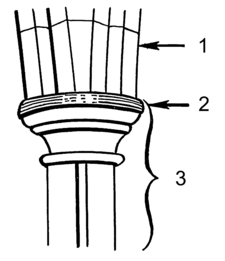settings
Les Misérables vocabulary
789 vocabulary words, including people, places, music, artists, etc.
help & settings
[x]
-
impost
-
► definition
Definition:1. That which is imposed or levied; a tax, tribute, or duty; especially, a duty or tax laid by goverment on goods imported into a country. Syn. -- Tribute; excise; custom; duty; tax.2. (Arch.) The top member of a pillar, pier, wall, etc., upon which the weight of an arch rests.Note: The impost is called continuous, if the moldings of the arch or architrave run down the jamb or pier without a break.Noah Webster. Webster's Unabridged Dictionary (1913) (indicated by number 2 in the image)image: by Pearson Scott Foresman, CC0, https://en.wikipedia.org/wiki/File:Impost_(PSF).png
(indicated by number 2 in the image)image: by Pearson Scott Foresman, CC0, https://en.wikipedia.org/wiki/File:Impost_(PSF).png
► uses
Uses:
‘You miss the imposts of your country. You miss the house dues?’ observed Chollop.
‘And the houses—rather,’ said Mark.
‘No window dues here, sir,’ observed Chollop.
Charles Dickens. Martin Chuzzlewit (1844)
---
Before his departure for Lombardy, Chaucer — still holding his post in the Customs — selected two representatives or trustees, to protect his estate against legal proceedings in his absence, or to sue in his name defaulters and offenders against the imposts which he was charged to enforce.
Chaucer. The Canterbury Tales (from the intro by D. Laing Purves)
---
the shutters did not reach to the top of the window. The impost was clear.Maurice Leblanc. Arsène Lupin versus Herlock Sholmes (1910)
---
Had a fine view of the five Neptunian asteroids, and watched with much interest the putting up of a huge impost on a couple of lintels in the new temple at Daphnis in the moon.
Edgar Allan Poe. The Works of Edgar Allan Poe — Volume 4: Mellonta Tauta (1849)

